Toyota Motor Bundle
Who Really Calls the Shots at Toyota Motor Corporation?
Unraveling the mystery of "Who owns Toyota Motor Company?" is more than just a question of corporate structure; it's a key to understanding the future of one of the world's automotive giants. Knowing Toyota's ownership reveals the forces shaping its strategic decisions and influencing its global impact. A deep dive into Toyota ownership will illuminate the power dynamics behind this automotive behemoth.
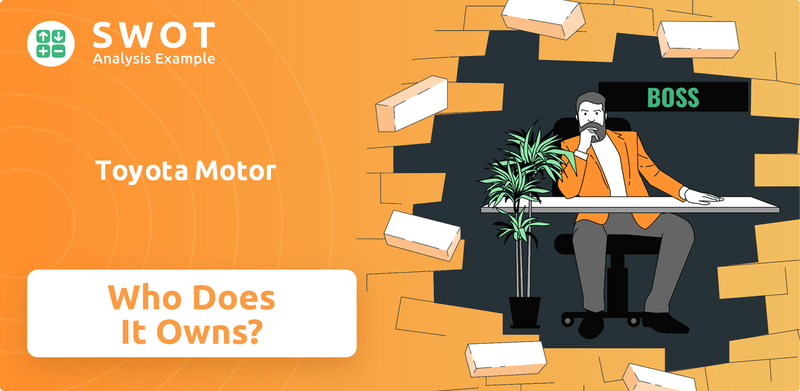
Understanding the Toyota Motor SWOT Analysis starts with knowing its foundation. Toyota Motor Corporation, a cornerstone of the global automotive industry, has a fascinating ownership story. From its roots in Japan to its current status as a publicly traded company, the evolution of Toyota's ownership structure has shaped its trajectory. This exploration will reveal the major Toyota shareholders, the influence of Toyota stock, and the dynamics of its parent company.
Who Founded Toyota Motor?
The story of Toyota Motor Corporation begins with the Toyoda family, specifically Kiichiro Toyoda. He established the company in 1937, branching out from his father, Sakichi Toyoda's, Toyoda Automatic Loom Works. Sakichi's focus on innovation and efficiency set the stage for Toyota's future success.
Early ownership of Toyota was primarily held by the Toyoda family and key individuals from Toyoda Automatic Loom Works. This structure emphasized a long-term vision and a commitment to quality. The company's roots were firmly planted in the engineering and manufacturing expertise of its founders.
The initial phase of Toyota's ownership did not involve significant external investors. Instead, the focus was on solidifying family control and ensuring the stable development of the automotive business. The founding family's vision was to create a self-sufficient and globally competitive car manufacturer.
Kiichiro Toyoda founded Toyota Motor Corporation in 1937.
The Toyoda family held significant control in the early years.
Toyota originated as a spin-off from Toyoda Automatic Loom Works.
The company's early focus was on quality and continuous improvement.
The founders aimed to create a globally competitive car manufacturer.
Early agreements prioritized family control and stability.
Understanding the Growth Strategy of Toyota Motor requires knowing its origins. The early ownership structure of Toyota Motor Corporation, centered around the Toyoda family, laid the foundation for its future success. The company's initial focus on quality, innovation, and long-term vision, as established by Kiichiro Toyoda, continues to influence Toyota's operations today. Currently, the company's market capitalization is substantial, reflecting its global presence and the enduring impact of its founding principles. As of late 2024, Toyota remains a leading player in the automotive industry, with a significant number of shares outstanding and a diverse shareholder base, though the Toyoda family's influence remains noteworthy.
Toyota Motor SWOT Analysis
- Complete SWOT Breakdown
- Fully Customizable
- Editable in Excel & Word
- Professional Formatting
- Investor-Ready Format
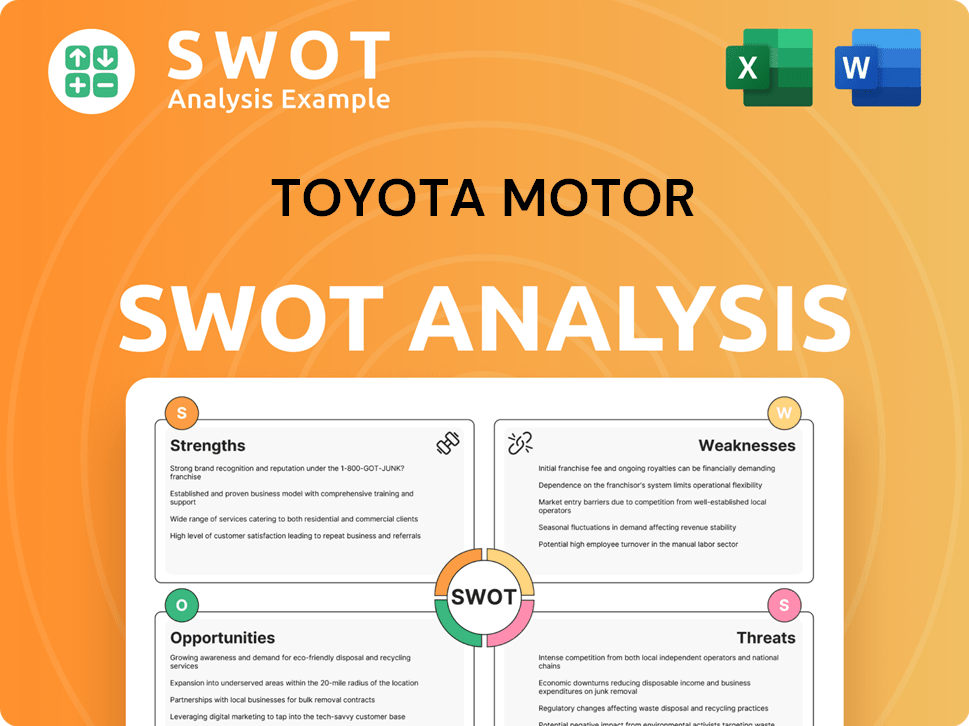
How Has Toyota Motor’s Ownership Changed Over Time?
The Competitors Landscape of Toyota Motor underwent a significant transformation in 1949 when it transitioned from a privately held entity to a publicly traded company through its initial public offering (IPO). This strategic move opened the door for broader investment and fueled the company's expansion following World War II. This shift marked the beginning of a more diverse ownership structure, moving beyond the founding family's direct control.
Over the years, the ownership of Toyota Motor Corporation has evolved, incorporating a variety of institutional investors, mutual funds, and individual shareholders. The founding family, however, has maintained a significant influence. This evolution reflects the company's growth and its integration into the global financial markets.
| Key Event | Impact on Ownership | Year |
|---|---|---|
| Initial Public Offering (IPO) | Transition from private to public ownership, enabling broader investment. | 1949 |
| Growth and Expansion | Increased institutional and individual shareholder base. | Ongoing |
| Strategic Partnerships and Investments | Potential shifts in ownership percentages due to collaborations. | Ongoing |
As of early 2025, the major stakeholders in Toyota Motor Corporation include significant institutional investors. These include The Master Trust Bank of Japan, Ltd. (acting as trustee for various pension funds), Toyota Industries Corporation, and Custody Bank of Japan, Ltd. (also as trustee). These entities collectively hold a substantial portion of Toyota's outstanding shares. For example, as of March 31, 2024, The Master Trust Bank of Japan, Ltd. held a considerable stake. Toyota Industries Corporation also maintains a notable shareholding, reflecting historical ties. Individual insiders, primarily board members and executive management, also hold shares, aligning their interests with the company's performance. The current ownership structure, with its substantial institutional investor base, generally supports Toyota's focus on long-term strategies, including R&D, global expansion, and sustainable growth.
Toyota's ownership structure has evolved significantly since its IPO in 1949, transforming from a privately held entity to a publicly traded company.
- Major shareholders include institutional investors like The Master Trust Bank of Japan, Ltd. and Toyota Industries Corporation.
- The ownership structure supports long-term strategic goals, including R&D and global expansion.
- Individual insiders, such as board members, also hold shares, aligning interests with company performance.
- Understanding the ownership structure is crucial for investors and stakeholders.
Toyota Motor PESTLE Analysis
- Covers All 6 PESTLE Categories
- No Research Needed – Save Hours of Work
- Built by Experts, Trusted by Consultants
- Instant Download, Ready to Use
- 100% Editable, Fully Customizable
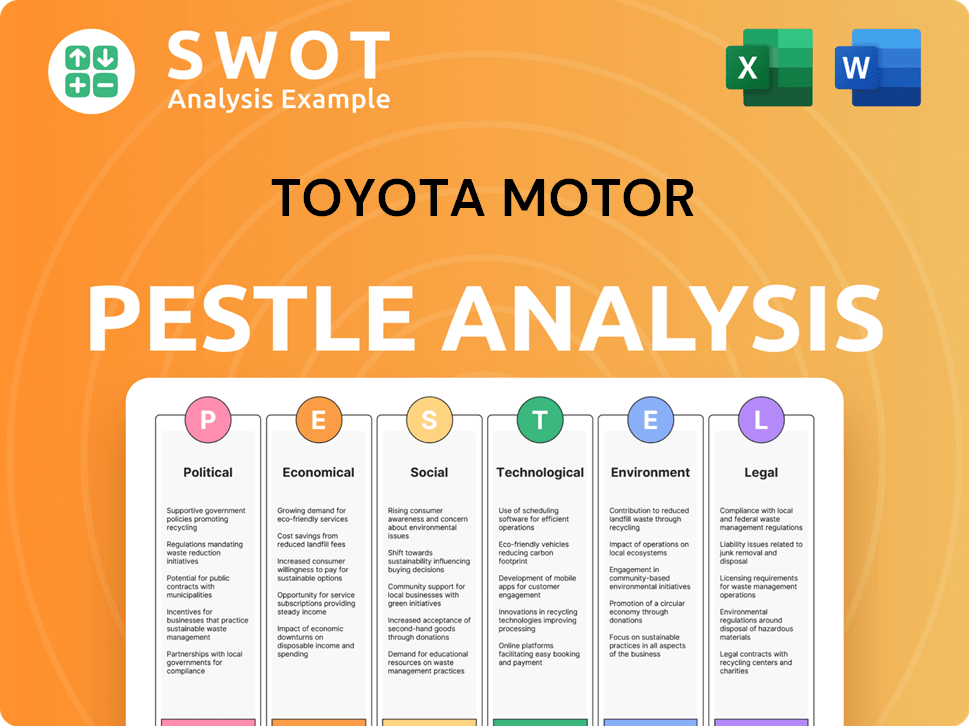
Who Sits on Toyota Motor’s Board?
The Board of Directors of Toyota Motor Corporation, as of early 2025, is responsible for overseeing the company's strategic direction and ensuring its operational effectiveness. The board includes a combination of internal executives, representatives from major shareholders, and independent directors. Key figures such as Akio Toyoda, who previously served as President and CEO, often hold significant positions, reflecting the enduring influence of the founding family. Other board members include top executives from various operational divisions, ensuring direct representation of the company's strategic priorities. Independent directors are appointed to provide external oversight and ensure corporate transparency and accountability.
The composition of the board reflects a balance of experience and expertise, with members possessing deep knowledge of the automotive industry, global markets, and corporate governance. The board's decisions are critical to the company's performance, influencing everything from product development and market expansion to financial strategies and sustainability initiatives. The board's role is to ensure that Toyota remains competitive and adaptable in a rapidly evolving global automotive landscape. The board's oversight is particularly important as Toyota navigates challenges such as the transition to electric vehicles and the increasing competition from new market entrants.
| Board Member | Position | Notes |
|---|---|---|
| Akio Toyoda | Chairman | Grandson of the founder, significant influence. |
| Kenta Kon | President and CEO | Oversees day-to-day operations and strategic initiatives. |
| Shigeki Tomoyama | Director | Oversees various operational divisions. |
Toyota operates on a one-share-one-vote voting structure for its common shares. While there are no publicly disclosed dual-class shares or golden shares, entities like The Master Trust Bank of Japan, Ltd. and Toyota Industries Corporation hold significant shares, which can exert considerable influence on key decisions. The stability in governance allows Toyota to pursue long-term strategic initiatives, such as its significant investments in electric vehicles and autonomous driving technologies. As of early 2025, Toyota's market capitalization is substantial, reflecting its strong financial performance and global presence. The company's commitment to innovation and sustainability, along with its robust governance structure, positions it well for future growth.
Understanding the Toyota ownership structure is crucial for investors and stakeholders. Who owns Toyota is a question that involves multiple entities and individuals. The Toyota parent company, Toyota Motor Corporation, is a publicly traded company.
- The Master Trust Bank of Japan, Ltd. and Toyota Industries Corporation are major shareholders.
- The Toyoda family maintains influence through board representation.
- Toyota shareholders include institutional investors and the public.
- Toyota stock can be purchased on major stock exchanges.
Toyota Motor Business Model Canvas
- Complete 9-Block Business Model Canvas
- Effortlessly Communicate Your Business Strategy
- Investor-Ready BMC Format
- 100% Editable and Customizable
- Clear and Structured Layout
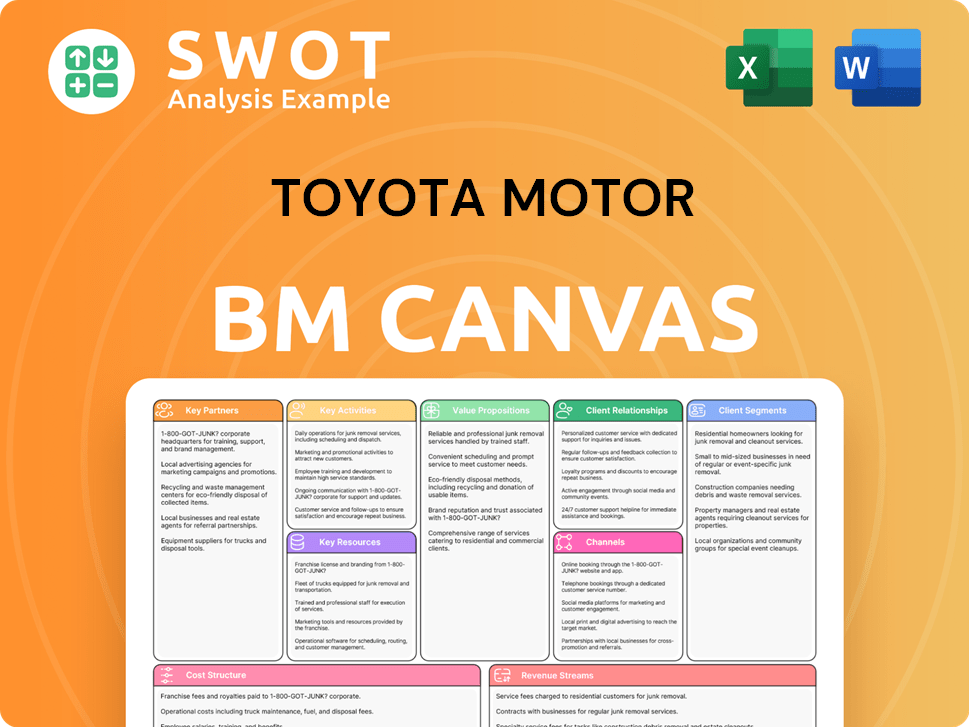
What Recent Changes Have Shaped Toyota Motor’s Ownership Landscape?
Over the past few years, the ownership landscape of Toyota Motor Corporation has remained relatively stable. The company has continued its share repurchase programs, reflecting a commitment to its shareholders. For example, in May 2024, Toyota approved a buyback program worth up to 100 billion yen. These actions help manage the outstanding share count and return value to investors.
Leadership transitions, such as Akio Toyoda's move to Chairman in April 2023, have not significantly altered the ownership percentages of major stakeholders. Institutional investors, including large asset managers and pension funds, continue to hold substantial portions of Toyota's stock. While the Toyoda family's influence persists through strategic positions, the overall ownership structure has seen no dramatic shifts. The company's emphasis on its long-term vision, including its multi-pathway approach to carbon neutrality, is supported by this stable ownership base. Toyota remains a key player in the global public markets, with no public announcements regarding privatization.
The company's commitment to returning value to shareholders through share buybacks and its stable ownership structure reflect its strong financial position. As of early 2024, the market capitalization of Toyota Motor Corporation is approximately $250 billion. This stability provides a solid foundation for its strategic initiatives and future growth. The ongoing trend of institutional ownership underscores the confidence in Toyota's long-term prospects and its ability to navigate the evolving automotive industry.
Major shareholders include institutional investors and the Toyoda family. These stakeholders play a crucial role in shaping the company's strategic direction. Understanding who owns Toyota provides insights into its governance and long-term vision.
Toyota's stock performance reflects the company's financial health and market position. Investors can track Toyota stock through major stock exchanges. Analyzing Toyota's financial performance is essential for understanding its value.
The ownership structure of Toyota Motor Corporation is primarily composed of institutional investors and individual shareholders. The Toyoda family maintains a significant influence. Understanding the ownership structure is key to grasping who controls Toyota Motor Corporation.
Toyota's future outlook includes continued focus on innovation and sustainability. The company's stable ownership base supports its long-term strategies. Toyota's commitment to its shareholders is a key factor for its success.
Toyota Motor Porter's Five Forces Analysis
- Covers All 5 Competitive Forces in Detail
- Structured for Consultants, Students, and Founders
- 100% Editable in Microsoft Word & Excel
- Instant Digital Download – Use Immediately
- Compatible with Mac & PC – Fully Unlocked
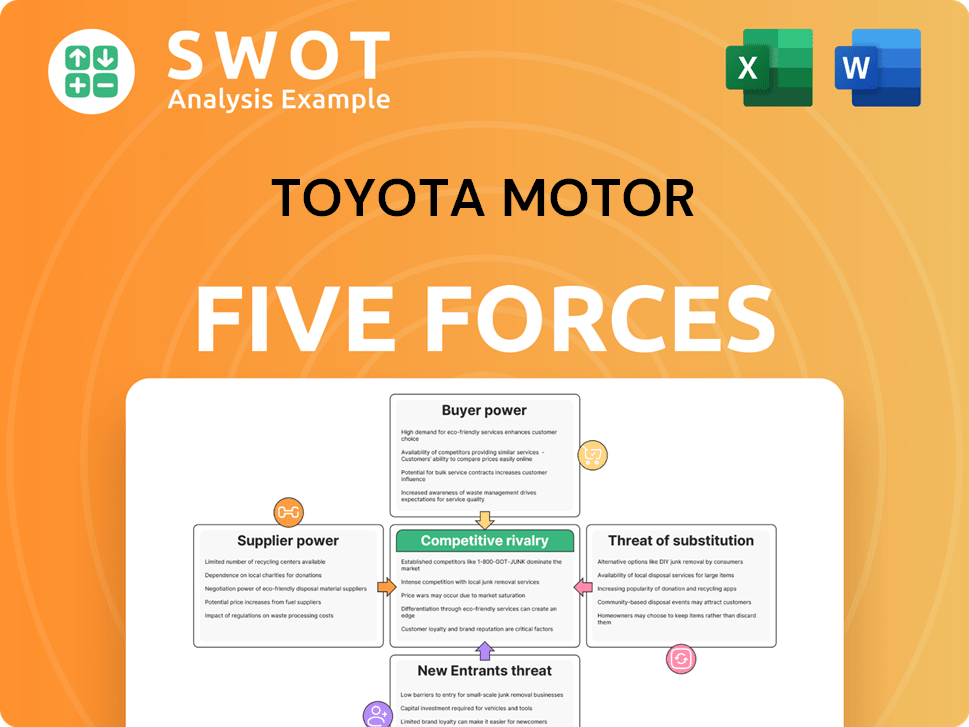
Related Blogs
- What are Mission Vision & Core Values of Toyota Motor Company?
- What is Competitive Landscape of Toyota Motor Company?
- What is Growth Strategy and Future Prospects of Toyota Motor Company?
- How Does Toyota Motor Company Work?
- What is Sales and Marketing Strategy of Toyota Motor Company?
- What is Brief History of Toyota Motor Company?
- What is Customer Demographics and Target Market of Toyota Motor Company?
Disclaimer
All information, articles, and product details provided on this website are for general informational and educational purposes only. We do not claim any ownership over, nor do we intend to infringe upon, any trademarks, copyrights, logos, brand names, or other intellectual property mentioned or depicted on this site. Such intellectual property remains the property of its respective owners, and any references here are made solely for identification or informational purposes, without implying any affiliation, endorsement, or partnership.
We make no representations or warranties, express or implied, regarding the accuracy, completeness, or suitability of any content or products presented. Nothing on this website should be construed as legal, tax, investment, financial, medical, or other professional advice. In addition, no part of this site—including articles or product references—constitutes a solicitation, recommendation, endorsement, advertisement, or offer to buy or sell any securities, franchises, or other financial instruments, particularly in jurisdictions where such activity would be unlawful.
All content is of a general nature and may not address the specific circumstances of any individual or entity. It is not a substitute for professional advice or services. Any actions you take based on the information provided here are strictly at your own risk. You accept full responsibility for any decisions or outcomes arising from your use of this website and agree to release us from any liability in connection with your use of, or reliance upon, the content or products found herein.